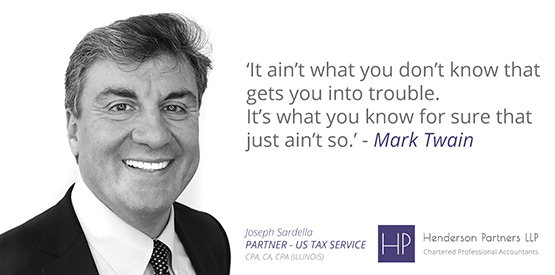When it became clear that Donald Trump would win the United States presidency on U.S. election night, it was reported that Canada’s immigration website crashed. Disgruntled Americans reacted by deciding moving to Canada for political, tax or other reasons was more appealing than enduring a Trump presidency. Although moving to Canada to escape the Trump administration seems like an easy fix, escaping the Internal Revenue Service is another matter altogether. There remains a misconception that one’s U.S. tax filing obligations stop after departing from U.S. soil. There is an expectation and acceptance that U.S. tax reform is imminent with the possibility of reduced U.S. tax rates, but unless President Trump disbands the IRS, the U.S. focus on chasing Americans’ unreported offshore assets will not stop. The purpose of this article is to highlight the U.S. tax filing obligations of American citizens and review options available to those who are behind in their U.S. tax filings.
U.S. citizens, even those who moved out of the U.S. in their youth, are required by law to file annual U.S. income tax and financial information returns (referred to as FinCEN or FBAR forms) or risk significant fines, penalties and even jail time in the more blatant cases of tax evasion.
What happens if a U.S. citizen never filed U.S. tax returns or bank forms because he or she was unaware of the filing requirement but now wants to become tax compliant?
The IRS has five “amnesty” tax programs available, with the most appropriate program depending on the taxpayer’s circumstances. These programs have been extremely successful. On October 21, 2016, the IRS announced it had collected more than $10 billion USD in tax, interest and penalties from more than 100,000 taxpayers who took advantage of IRS amnesty programs. For many U.S. citizens living in Canada, the best suited program is the amnesty program referred to as the “Streamlined Foreign Offshore Procedures” (SFOP).
In addition to the income tax returns and banking forms, a taxpayer must also certify under penalties of perjury that their conduct (i.e. not filing U.S. tax returns) was not willful. Conduct due to negligence, inadvertence, or mistake or conduct that is the result of a good-faith misunderstanding of U.S. tax law requirements would be considered not willful. If any of the above describe the taxpayer’s circumstances, the SFOP would allow for him or her to become tax compliant.
For those who doubt the resolve of the IRS’s enforcement efforts, one has only to look to the recent U.S. Department of Justice November 2, 2016 News Release. An emeritus professor at the University of Rochester pled guilty to conspiring with others to defraud the U.S. government and was slapped with a $100,000,000 USD penalty for failing to report certain foreign bank accounts to the IRS as required. His sentencing is set for February 2017.
As in any amnesty program, time is of the essence. The IRS may change or terminate all or any one of the programs at any time. The SFOP amnesty program is the only program that imposes no penalties and grants the taxpayer immunity from criminal prosecution. To date, about 48,000 taxpayers have used the SFOP.
For taxpayers who have been filing U.S. tax returns but did not disclose their foreign bank accounts or, alternatively, have discovered certain information forms were missed or incomplete, there are additional programs with procedures that permit a taxpayer to correct non-willful omissions. For instance, taxpayers that hold foreign mutual funds, REITs, or ETFs in non-registered accounts are required to disclose each holding on Form 8621. The penalty for late filing or not filing this form is $10,000 USD per form. Therefore, holding three mutual funds within your TFSA but failing to timely file three Form 8621 disclosures would leave you liable for a $30,000 USD penalty. If you can certify these were non-willful omissions, filing under an amnesty program would allow you to add the disclosure forms to your filings without risk of penalty.
After reading about the intricacies of U.S. tax regime, most Americans living abroad first think to renounce their U.S. citizenship and avoid it altogether. Unfortunately, tax returns for the prior five years must be filed before the U.S. government will honour U.S. expatriation.
Tax amnesty filings and renunciations are very complex and should only be handled by CPAs who possess the experience needed to advise and prepare a complete, accurate submission. Our U.S. tax group has over 25 years of experience in helping clients become compliant with the IRS. Please contact one of our partners for a confidential assessment of your tax situation.
